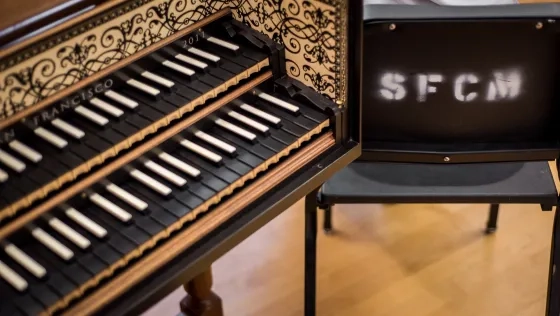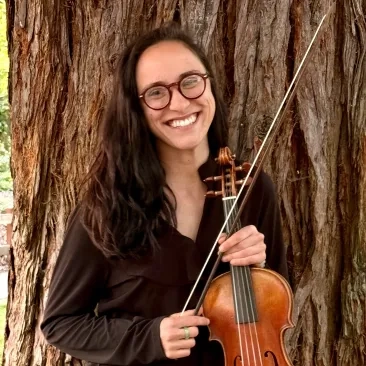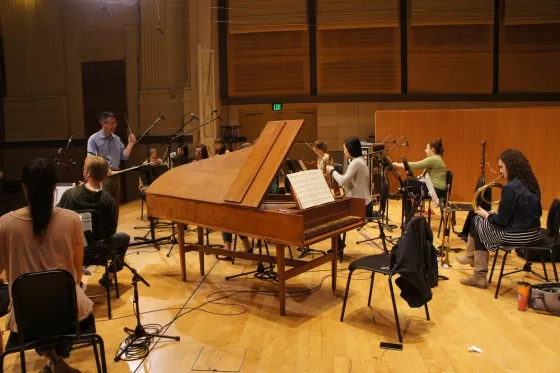SFCM's Historical Performance Department Isn't a Museum—And They Want You to Know It
The SFCM Baroque Orchestra's concert on Oct. 12 is a celebration of Viennese music, but Historical Performance Department Chair Corey Jamason is keen to highlight these performances aren't reenactments.
What do SFCM's Historical Performance (HP) Department and punk rock have in common?
"The spirit of historical performance is to question authority," HP Chair Corey Jamason says, well, authoritatively. "That's what we try to underline here, and it's not just lip service. We really do mean it when we want people to find their own voice: We want them to question us, to not take anything for granted."
Because HP repertoire covers hundreds of years, the vast bulk of which existed before recording technology existed, Jamason says, that—counter to what people might expect—there's an enormous amount of freedom for individual interpretation for performers.
"Our goal is not to recreate the past, because that's not possible," Jamason continues. "What's very important to me is that the students don't just necessarily take the mantle from us older people. We want them to rethink everything: performance venues, concert programming—every aspect to recreate and to redefine this movement for the future."
Student Alexandra Santon (right), who switched to HP from her original violin performance path, recalls her "lightbulb" moment came from studying with Elizabeth Blumenstock (Baroque violin and viola). "I had a moment in a lesson where I said to her, 'I think I was a robot for a lot of my life.' I felt I had been seeing music in more of a surface-level way, and historical performance really got me to think about the music on a deeper level, to really question things and come up with your own end result."
Santon and Jamason both highlight the deep community around historical performance music in the Bay Area, much of it owing to Laurette Goldberg, who taught at SFCM for decades and founded San Francisco's Philharmonia Baroque and its Early Music Society.
"There's a bunch of historical groups in the Bay Area, and once I started getting my name out there, they just felt like family," Santon says. "There's not really that much competition, so it was just more of an encouraging environment. We all work for the same organizations, and I'm performing now more as a historical violinist than a 'modern' one."
"We really have a loyal audience who come to our historical performance shows time and time and time again," Jamason says. "And it's a particular pleasure for them to watch these students develop and then become part of these professional orchestras." Students also strike out on their own, bolstered by this community: 2023 grads Yunyi Ji (harpsichord and piano) and Hasan Abualhaj (historical cello) founded their own performance group, Parallax Concerts, which debuted in 2024 at St. Joseph's Arts Society.
HP department performances range further than many would assume. In 2024, a performance offered audiences an ear to what early Broadway performances would have sounded like, while other performances have covered Appalachian ballads (many of which would form the bedrock for the folk music boom of the 1960s) and how jazz improvisation overlaps with historical Baroque techniques. The department has participated in contemporary works like Composition Department faculty Mason Bates' Auditorium (commissioned by the San Francisco Symphony), and SF's Philharmonia Baroque (where many students, like alumna Maya Kherani, perform) has a longstanding relationship with contemporary composer Caroline Shaw.
For her part, Santon is looking forward to joining the thriving Bay Area HP community. "I have recording projects coming up, and I'm gigging around and teaching. I love my colleagues, and I've made enough connections to make a living in the Bay Area, and I plan to stay here."
Students like Santon becoming active performers and teachers, Jamason says, are what continue to keep the world of historical performance vital.
"The last thing we want is this idea of this music as dusty and quaint, to be performed wearing historical costumes. We want this questioning of authority spirit to remain, where students and young artists look at primary sources, look at the materials, look at what we're teaching—but still make their own decisions. That's what it's about."
SFCM's Baroque Orchestra concert is Oct. 12, 2025 at 2:00 p.m: Reserve your ticket here.
Learn more about studying historical performance at SFCM.


